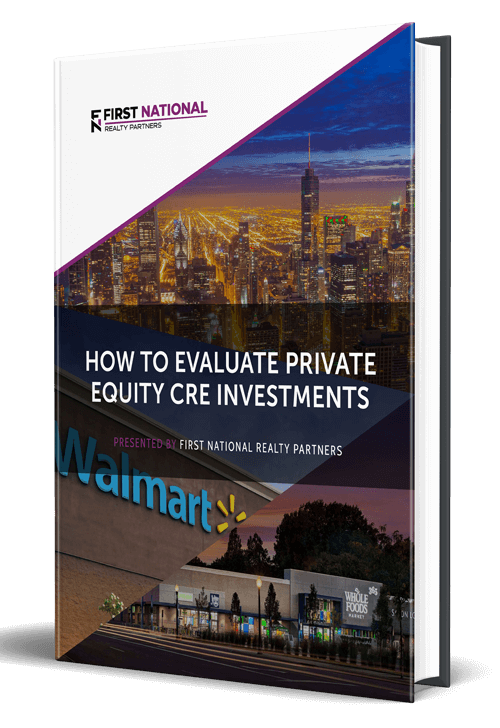If you’ve decided that you’d like to make a commercial real estate investment, two logical questions likely follow: what type of property are you going to invest in and what type of investment are you going to make?
Regarding property type, there are four broad commercial real estate asset classes: retail, industrial, office, and multifamily. Each have their strengths and weaknesses and their relative performance is closely correlated to sub-market demand and broader macroeconomic trends.
An investment in any of the asset classes can be made by purchasing a property directly, through an LLC or with a small group of partners. Or, it can be made indirectly by placing your funds with an asset manager and outsourcing the job of finding, analyzing, closing, and managing a property to them.
As a direct investor, you’ll retain control over key investment selection and property management decisions, but your ability to scale a portfolio may be constrained by resources and deal flow may be limited to your immediate network. Working with an asset manager — like a private equity firm — usually involves a fee for the expertise they bring to a transaction, but it also brings a variety of benefits not available to a direct investor.
What is a Private Equity Commercial Real Estate Firm?
A private equity firm is an investment management company that pools money from investors — individual or institutional — and uses it to purchase assets with the expectation of earning a return. Private equity firms tend to specialize in certain areas such as startup capital, leveraged buyouts, or growth capital.
A private equity commercial real estate firm is one that specializes in the purchase and management of real estate assets on behalf of their investors. In a typical transaction, they’ll use investor funds to supply the equity needed to purchase the asset and work with a lender or partner to finance the remainder of the purchase with debt.
Because private equity investments aren’t regulated the same way that publicly traded investments are, they’re typically limited to to investors who meet certain financial requirements or those that are “sophisticated,” meaning that they’ve demonstrated the ability to accurately assess the risk associated with the transaction. For investors that meet these requirements, a private equity commercial real estate investment can yield material benefits.
Benefits of Investing with a Private Equity Firm
The primary benefit of commercial real estate investing alongside a private equity firm is that they provide access to institutional quality assets that are typically out of reach for all but the wealthiest individual investors. In addition, it’s a relatively passive investment because the work of finding and managing assets is performed by the firm. While these are the headline benefits, there are also a series of lesser-known advantages:
- Alignment of Incentives: Private equity firms charge a fee, but that fee is structured in a way that aligns the interest of the investor with those of the firm. In a typical arrangement, the investor is offered a “preferred return” up to a certain amount, say 8%, and anything over this amount is split between the
investors and the firm. This structure incentivizes the firm to manage the investment in a way that’ll benefit both the investors and themselves. - Income: Many private equity investments, such as those associated with the multifamily or office asset classes, produce income from the rent paid by property tenants. The income is used to pay for the property’s operating expenses and anything left over is passed to investors.
- Tax Efficiency: Property income can be offset by strategies like depreciation and cost segregation making the investment a tax efficient one. Further, taxes on a gain may be deferred indefinitely through the use of the 1031 Exchange program or by rolling profits into a tax advantaged structure such as a Delaware Statutory Trust.
- Diversification: Real estate price movements tend to have a low level of correlation with those of other asset classes, meaning that exposure to the asset class can provide portfolio diversification and stability in times of economic contraction.
- Expertise: Private equity firms are run by professionals with years or even decades of expertise in selecting, underwriting, and managing real estate assets. In addition, they have access to vast networks of broker and developer relationships that often result in deals that aren’t available to the individual investor.
Private Equity Downsides to Consider
All investments have risk and those made with a private equity firm is no different. There are three potential downsides that all investors should consider to ensure a private equity investment is suitable for them:
First, is the time horizon. Private equity investments often require that investor funds be tied up for five years or more. Investors considering partnering with a private equity firm should be aware of the time commitment and be comfortable with it because early withdrawals can be difficult and/or expensive.
Next, there are hundreds if not thousands of private equity firms that offer real estate investment opportunities and they’re not created equally. It’s important to work with firms that have a long term reputation for delivering consistent returns.
Lastly, private equity investments can be expensive. It’s important to understand the fee structure, how the “preferred return” works and what the profit split looks like once the return hurdle has been met. These items are typically outlined in the offering documents and should be reviewed with real estate attorneys, tax advisors, and accountants prior to committing funds to a deal.
Interested in Learning More?
First National Realty Partners is one of the country’s leading private equity commercial real estate investment firms. With an intentional focus on finding world-class, multi-tenanted assets – including middle-market service-oriented retail shopping centers – well below intrinsic value, we seek to create superior long-term, risk-adjusted returns for our investors while creating strong economic assets for the communities we invest in.
Whether you’re just getting started or searching for ways to diversify your portfolio, we’re here to help. If you’d like to learn more about our middle market retail investment opportunities, contact us at (800) 605-4966 or info@fnrpusa.com for more information.






